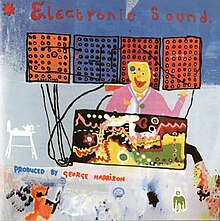Electronic Sound
| Electronic Sound | ||||
|---|---|---|---|---|
 |
||||
| Studio album by George Harrison | ||||
| Released | 9 May 1969 | |||
| Recorded | November 1968; February 1969 | |||
| Studio | Sound Recorders Studio, Los Angeles; Kinfauns (Harrison's home), Surrey | |||
| Genre | Avant-garde,electronic music | |||
| Length | 43:50 | |||
| Label | Zapple | |||
| Producer | George Harrison | |||
| George Harrison chronology | ||||
|
||||
| Professional ratings | |
|---|---|
| Review scores | |
| Source | Rating |
| AllMusic | |
| MusicHound | 1/5 |
| Rolling Stone | (mixed) |
| The Rolling Stone Album Guide | |
| Uncut | |
Electronic Sound is the second studio album by George Harrison. Originally released in 1969, it was the second and final record released on the Beatles' short-lived Zapple record label, a subsidiary of Apple Records. The album comprises two lengthy pieces performed on the Moog synthesizer. Harrison subsequently introduced the instrument to the Beatles' sound; the band featured synthesizer for the first time on their 1969 album Abbey Road.
The first digital edition of Electronic Sound appeared on CD in 1996. Digital editions use a different track order from some of the original vinyl LP copies.
Zapple was intended as a creative outlet for avant-garde musical works. The music on Electronic Sound, consisting of two extended instrumental pieces – "Under the Mersey Wall" and "No Time or Space" – was performed on a Moog IIIc modular system. Harrison bought the system directly from Robert Moog and later had it set up at EMI Studios in London for the Beatles to use on their recordings.
According to the album's liner notes, "No Time or Space" was recorded "in California in November 1968 with the assistance of Bernie Krause". The information for "Under the Mersey Wall" reads: "Recorded at Esher in Merrie England; with the assistance of Rupert and Jostick The Siamese Twins – February 1969." Krause later said that "No Time or Space" (UK LP side two, US LP side one) was essentially a recording of him demonstrating the Moog III to Harrison. Krause also claimed that the demonstration was recorded and released without his knowledge or consent. Krause's name was originally credited on the front cover under Harrison's credit, but it was painted over at Krause's insistence. The words "Assisted by Bernie Krause" can nevertheless still be read under the silver ink on original LP pressings. Portions of white noise from "No Time or Space" are used throughout "I Remember Jeep", a track on Harrison's 1970 triple album, All Things Must Pass.
...
Wikipedia
